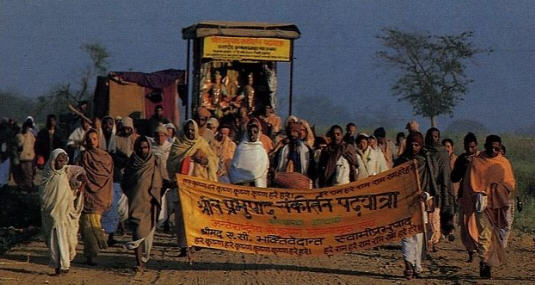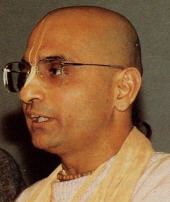The worldwide activities of the International Society for Krishna Consciousness (ISKCON)
Devotees Tour The Land of Krsna
Vrndavana, India On the first day of the auspicious month of Kartika (October-November), more than eighty devotees from twenty countries left from ISKCON's Krishna Balaram Mandir here for a traditional thirty-day, 168-mile walking pilgrimage through the holy land of Krsna. The pilgrimage was organized by the ISKCON Pada-yatra, under the management of Lokanatha Swami and Mahanidhi Swami. It is known as the "Vraja-mandala Parikrama."

ISKCON Padayatra at Vrndavana
The parikrama (pilgrimage) path winds through the twelve major forests of Vrndavana, where Lord Krsna enacted His transcendental pastimes five thousand years ago. The path was established by Narayana Bhatta Gosvami, a follower of the six Gosvamis of Vrndavana, Lord Caitanya's chief associates.
Following tradition, the devotees first bathed in the Yamuna River at Visrama-ghata, in the holy city of Mathura. The procession was led by the Pada-yatra elephant, Laksmi, who was followed by devotees chanting and dancing before the deities of Lord Caitanya, Lord Nityananda, and Srila Prabhupada. Devotees distributed Srila Prabhupada's books to interested persons along the way.
Walking barefoot, the pilgrims visited the holy places associated with Lord Krsna's pastimes and heard the transcendental glories of Vrndavana as described in the Vedic literature. Morning and evening they would gather to worship the deities, chant Hare Krsna, and offer ghee lamps to Lord Krsna, as prescribed during the month of Kartika.
One particularly memorable event was the midnight bathing ceremony honoring the appearance of Sri Radha-kunda, a pond that is especially dear to Lord Krsna. Joining throngs of pilgrims, the devotees joyfully bathed in the sacred waters.
This was the second Vraja-mandala Parikrama organized by ISKCON's Pada-yatra. This year's parikrama included special visits to Javat, the home of Srimati Radharani's relatives, and Badarikasrama and Kedarnatha in Vraja (Vrndavana). The holy sites of Badarikasrama and Kedarnatha in the Himalayas are expansions of these original holy places in Vraja.
The devotees completed the pilgrimage by bathing at Visrama-ghata on the full-moon day that marks the end of the month of Kartika.
Conference on Reincarnation

Bhakti Caru Swami
Basle, Switzerland Bhakti Caru Swami, a member of ISKCON's Governing Body Commission, was one of fifteen hundred theologians, philosophers, psychologists, and para-psychologists from ten countries and four continents who met for four days here for the Sixth Congress on Interdisciplinary Discussion of Border Area Problems of Science.
Bhakti Caru Swami and some of the other participants were later interviewed on Swiss Radio International (SRI) in Bern. Professor Alex Schneider, president of the Swiss Society of Parapsychology, explained, "In parapsychology you'll find all the subjects that the normal science doesn't want, and so reincarnation landed in parapsychology. I'm convinced that something exists what we call reincamation but I can't say what it is, really. We felt that it's now time to discuss this problem. I think we know only ten percent of the truth."
"To gain understanding of the doctrine of reincarnation," the interviewer for SRI said, "the participants were taken back to the first writings on the subject three thousand years before Christ." Bhakti Caru Swami, citing several verses from theBhagavad-gita, then explained that the soul is eternal and that reincarnation is simply the rejection of an old body and the acceptance of a new one. "It's like vacating a dilapidated house," he said.
One of the important aspects of the conference was to discuss what elements of traditional Eastern philosophy apply to Western religion and philosophy. Geddes MacGregor, professor of Christian Theology at UCLA spoke on reincarnation and Christianity: "I would say this is the most confused aspect of Christian teaching; therefore, I'm inclined to treat reincarnation as aligned with the resurrection, and also with the concept of purgatory. This is done in various treatises within Christianity, including the writings of St. Catherine of Genoa and St. Thomas. The implication is that reincarnation is to be taken as normal, something which is part of the Christian outlook."
Dr. Jamuna Prasad, an Indian psychologist who takes a modem, scientific approach to the study of reincarnation, has conducted reincarnation research with children. He says, "There is so much evidence that we cannot brush it aside and say it is all nonsense. The implications of these findings are far-reaching for man in general. Ideals regarding creed, nationality, etc., will change, and we can move closer to universal brotherhood and peace."
